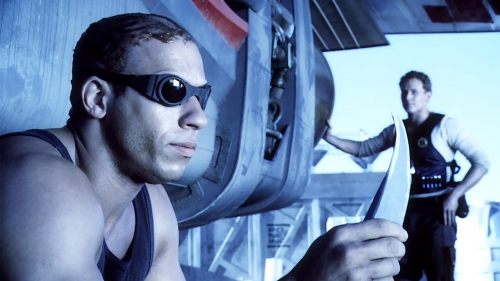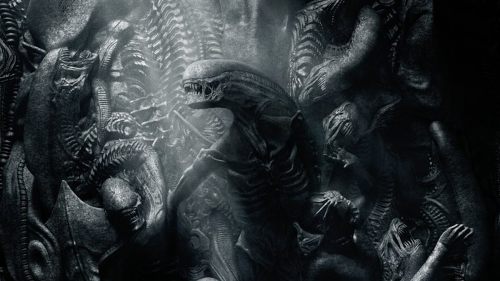PITCH BLACK: Evolving A Knock-Off Into Something Distinct
Alien: Covenant is almost here. Get your tickets now!
The Chronicles of Riddick is the most frustrating of Vin Diesel’s franchises. It is set in an interesting universe and built around a fascinating lead character. But Diesel and writer/director David Twhoy have consistently taken the series in disappointing directions. They have done away with Richard B. Riddick, a ruthless murderer who might not have been as coldhearted as he believed, a man who simultaneously believed in and despised God, a man who was sincerely astonished by a peer’s willingness to risk her life for other people. In his place, they have put RIDDICK, the last scion of a murdered people and the baddest dude in the galaxy. He’s outrun the sun. He’s vanquished an evil undead god-king and claimed his empire as his own. He’s reacted to betrayal by stripping naked on a dead world, fighting its beasts and making clothes from their hides to reclaim his inner savagery. He’s a man of great melancholy without much in the way of mirth. Both he and his later movies have their moments (minus the utterly baleful animated short Dark Fury) but, at least for my money, they’re not as interesting or as successful as their progenitor, 2000’s excellent, striking science fiction/horror hybrid Pitch Black.
Pitch Black is, without a doubt, a riff on Alien and Aliens. It follows a small group of people who are trapped in an isolated location and menaced by vicious predators. It distinguishes itself from its justly iconic antecedents by blending aspects of both and using that blend to explore its own unique central themes. As in Alien, most of the protagonists are ordinary folks trying to survive and get on with their lives. They display both ingenuity and helplessness in the face of their utterly inhuman foe (a seemingly endless number of echolocation-wielding winged monsters called Bioraptors), but in the end, they must flee if they are to have any hope of survival. And as in Aliens, the heroes face both a massive hive of their alien foes and the selfishness, cowardice and cruelty of one of their own. The central dramatic arc hinges on the bonds formed by a group of strangers in a time of immense stress. Alien’s central theme is survival and what’s necessary for it. Aliens’ themes are motherhood and families, both healthy and toxic. Pitch Black’s cores are human failure and the work that redemption requires.
Critical to Pitch Black’s success in exploring its themes is its lack of a full-blown Ripley figure. Sigourney Weaver’s Ellen Ripley, whether as the Nostromo’s warrant officer or as a civilian advisor to the Colonial Marines’ investigation, is brave, courageous and empathetic to the last. She is terrified by the Xenomorphs and traumatized by her battles with them, but she never stops standing. She is appalled and (in Alien directly) wounded by the casual, industrial-scale cruelty the Weyland-Yutani corporation practices as a matter of business, but she never gives in to despair or total misanthropy when she confronts them. Pitch Black has its share of genuinely good people amongst its ensemble, chiefly a Muslim Imam played by Keith David, but none of its three central characters are as noble or as mentally and emotionally healthy as Ripley. Radha Mitchell’s Carolyn Fry, Cole Houser’s Johns and Diesel’s Riddick have poisonous secrets and more than a few moments of weakness. They present themselves as things they aren’t, even to themselves, and reap the consequences of those deceptions. They all have difficulty balancing the needs of others against their own. Their arcs and their interactions with each other are the source of both Pitch Black’s best moments as a film and its exploration of failure and redemption.
Mitchell’s Fry might, at first glance, seem to be Pitch Black’s Ripley analogue. She’s forced into a position of leadership by horrendous circumstances, and ultimately proves to be a courageous hero. But she does not start out with the professionalism and decency that Ripley does. No, Fry starts out as a coward who crumbles under pressure at the expense of the people she’s transporting across the galaxy. She begins closer in temperament and character to Alien’s panicky, addled Lambert (Veronica Cartwright) than Ripley. When a meteor shower does irreversible damage to Fry’s ship and kills her Captain, she nearly jettisons the entire passenger compartment in a desperate attempt to save herself. She’s only stopped when her co-pilot Owens (Simon Burke) deliberately breaks the jettison system. She survives the crash. Owens does not. Fry, grappling with guilt and self-loathing, spends the rest of Pitch Black trying to protect the people she nearly killed to save her own neck. She witnesses the best and worst of humanity as the crash survivors try to escape the Bioraptors, and repeatedly wrestles with Riddick’s attempts to mold her into someone as ruthless and cold as he is himself. Ultimately Fry finds the strength to put others before herself, and her conviction both astonishes and impresses Riddick enough that he abandons his escape plan to help her rescue the last survivors. She dies saving Riddick, her last words a rebuke to his strange blend of arrogance and self-loathing: “I said I’d die for them. Not you. Come on!”
Hauser’s drug addicted bounty hunter Johns is easily the most loathsome character in Pitch Black. Like Fry at her worst, Johns would do anything to survive. But where Fry finds the strength to admit her catastrophic moral failure and works to atone, Johns proves utterly incapable of seeing beyond himself in any way. He steals the ship’s morphine supply to feed his addiction within a few moments of the crash. In doing so he condemns the mortally wounded Owens to a slow, agonizing death for the sake of a brief high. When Fry confronts him about this, he uses a painful wound left by an earlier encounter with Riddick as an excuse and blackmails her with her attempt to jettison the passengers. He offers Riddick his freedom in exchange for his help, and immediately plots to either murder him or strand him on the planet, whichever is more convenient. When the survivors make their push towards a small ship they can use to escape, and everything goes sideways, Johns decides that the best solution would be to kill another survivor and use the corpse to distract the Bioraptors. He also decides that the best person to murder would be Jack (Rhiana Griffith), a teenage girl who had been traveling disguised as a boy, and insists that Riddick be the one to kill her. This gets him killed, since even Riddick is appalled by his callousness. The two begin a duel that ends with the mortally wounded bounty hunter screaming as the Bioraptors set upon him. Johns owes a debt to Aliens’ hateful company man Carter Burke, but he’s more intimate in his cruelty and his violence, and where Burke at least cares enough to try and rationalize his actions, Johns does not care about anything. He’s a nihilist, and he wields his nihilism like a cudgel to get the next thing he wants.
And then there’s Riddick. For all that he may have mutated into SPACE CONAN in later works, in Pitch Black Riddick is a genuinely fascinating character. He claims to be self-aware of how horrible a person he is, and tries to treat everything and everyone with wry, detached disinterest. He fails. Riddick all but explicitly hates himself, and his efforts to deny his own humanity end up revealing that. Whether it’s his affirming that he simultaneously believes in and despises God when talking to the Imam or quietly admiring the beauty of the Bioraptors’ initial emergence from their hive, there is more to Richard Riddick than the murderer he so readily confesses to being. He has been isolated and treated like an animal all his life, and it shows in his cynicism and his brutality. But he is not dead inside. When Fry stops him just before he can take off and desert the remaining survivors, he attempts to seduce her into coming with him, asking her to do what he has done and think of herself. She refuses, and Riddick is taken aback. Infuriated, he attacks her and demands to know how far she would go for the others. Her answer, that she would die for them, astonishes Riddick enough that he helps Fry rescue the Imam and Jack. She even rescues him when the Bioraptors corner and wound him, although it ends in her death. Riddick is left astonished and despairing. “Not for me,” he says, somewhere between sorrow and anger, “Not for me.”
Riddick, Jack and the Imam successfully escape from the planet, incinerating many Bioraptors in the process. And then they are left to grapple with what has happened. Riddick seems particularly affected. He asks his companions to tell anyone they meet that Riddick died on the planet they fled. On one level, it’s a common-sense survival tactic for a wanted fugitive. And on another, it is something else. It’s a man who has had his worldview shattered trying to figure out what to do next. It’s a commonly used bit of storytelling that, through Twohy’s cinematic storytelling and Diesel’s performance, becomes striking and distinct. That’s the best way to describe Pitch Black really; it’s built from common parts, and its construction makes them something special.



